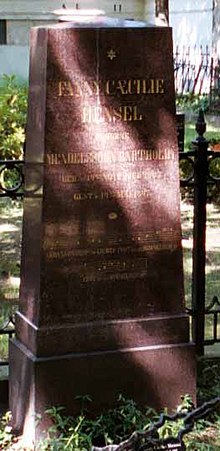This is an old revision of this page, as edited by Smerus (talk | contribs) at 12:25, 15 February 2006. The present address (URL) is a permanent link to this revision, which may differ significantly from the current revision.
Revision as of 12:25, 15 February 2006 by Smerus (talk | contribs)(diff) ← Previous revision | Latest revision (diff) | Newer revision → (diff)

Fanny Cäcilia Mendelssohn Bartholdy (November 14, 1805–May 14, 1847), later Fanny Hensel, was a German pianist and composer, and was the sister of Felix Mendelssohn.
Life
Fanny was born in Hamburg, the eldest child of Abraham Mendelssohn Bartholdy (son of the philosopher Moses Mendelssohn), and his wife Lea, née Salomon, a granddaughter of the entrepreneur Daniel Itzig. Fanny benefited from the same musical education and upbringing as her better known brother, sharing a number of his music tutors, including Zelter. Like Felix who was born in 1809, Fanny showed prodigious musical ability as a child and began to write music. Visitors to the Mendelssohn household in the early 1820s, including Ignaz Moscheles and Sir George Smart, were equally impressed by both siblings. However, she was limited by prevailing attitudes of the time against women, attitudes apparently shared by her father and brother, who were tolerant, rather than supportive, of her activities as a composer. Her father wrote to her in 1820 'Music will perhaps become his profession, while for you it can and must be only an ornament'.
In 1829, after a courtship of several years, she married the painter Wilhelm Hensel who was supportive of her composing. Subsequently, her works were often played alongside her brother's at the family home in Berlin in the very popular concerts which were held there.
Her public debut at the piano came in 1838, when she played her brother's Piano Concerto No. 1.

Fanny composed over 450 pieces of music, most of them in secret. Her compositions include a piano trio and several books of solo piano pieces and songs. A number of her songs were originally published under Felix's name in his opus 8 and 9 collections. One of these songs , 'Italy', was a favorite of Queen Victoria, who thought Felix had written it. Her piano works are often in the manner of songs, and carry the name Lieder ohne Worte (Songs without Words). This style of piano work was most successfully developed by Felix Mendelssohn, though some modern scholars believe Fanny may have preceded him in the genre.
Fanny Mendelssohn-Hensel died in Berlin in 1847 of complications from a stroke suffered while rehearsing one of her brother's oratorios, 'The First Walpurgis Night'. In recent years, her music has become better known thanks to concert performances and a number of CDs being released on labels such as Hyperion and CPO. Her reputation has also been advanced by those researching female musical creativity, of which she is one of the relatively few exemplars in the early 19th century.
External Links
Sources
Fanny's son Sebastian Hensel edited the family correspondence as 'The Mendelssohn Family 1729-1847' (tr. into English, 4th revised edition 1884) which still remains an important source of information about Fanny, Felix and their relatives.
Fanny's correspondence with Felix has been translated into English and edited by Marcia Citron; 'The letters of Fanny Hensel to Felix Mendelssohn'(New York, 1987).
R. Larry Todd's 'Mendelssohn - A Life in Music' (Oxford 2003) ISBN 0195110439 is the most recent comprehensive survey of Felix and contains much information about Fanny.
Categories: